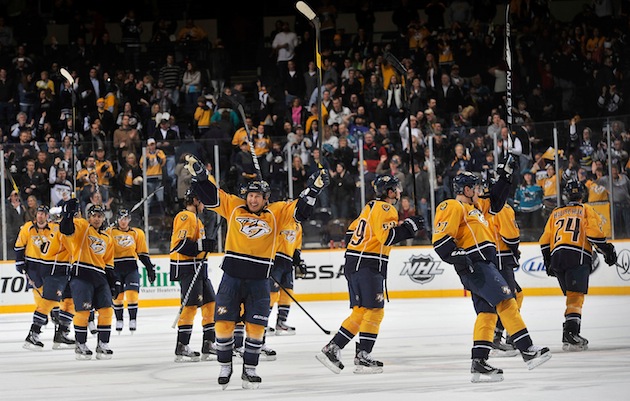 As I wrote last year, the thought of the Nashville Predators being treated with kids gloves is over and done with. The continuing praise of "doing so much with so little" is very tired considering, well, they've been doing so much with so little for so very long.
As I wrote last year, the thought of the Nashville Predators being treated with kids gloves is over and done with. The continuing praise of "doing so much with so little" is very tired considering, well, they've been doing so much with so little for so very long.
On the way to their seventh playoff appearance in the last eight seasons, the time of the Predators as the Little Engine That Could -- heaping praise on them for just succeeding in the Western Conference -- is long gone. If you weren't there yet, GM David Poile's moves before Monday's trade deadline should be the moment when you begin realizing Nashville is, and has been, more than just a heartwarming story of a small-market team doing good.
Years of instability at the ownership level are no more and Nashville's attendance, according to ESPN, has steadily risen after the initial honeymoon period wore off once they entered the NHL in 1998. It's become a hockey a town. A new kind of hockey town. And credit to the Predators organization for becoming a blueprint of sorts on how to build, develop and maintain a fanbase, even with those ownership speed bumps along the way.
Don't mind that some have just discovered this fact recently. Just watch an annual playoff game at Bridgestone Arena and the sell-out crowd, involved in the game will tell you so.
That growth of the organization and the Predators' success has now reached a vital point in its development. Realizing that, Poile moved all of his chips to the center of the table.
Facing the possibility of losing a stalwart defenseman in Ryan Suter to free agency this summer, and potentially Shea Weber next summer, the cap-strapped Predators acquired Hal Gill, Andrei Kostitsyn and Paul Gaustad, all three will be unrestricted free agents this summer. None were earth-shattering moves, but as Y!'s Nick Cotsonika pointed out, it was Poile's way of going for it now, while he still has his core roster intact:
The NHL isn't going to become less competitive, and the Predators might not be in a better position any time soon. They have one of the game's best goaltenders in Pekka Rinne. They added an imposing presence in Gill to a defense corps led by Suter and Weber. They added Andrei Kostitsyn to an offense that ranks 10th in the league, and coach Barry Trotz has gotten the best out of Andrei's brother, Sergei, in Nashville. They strengthened themselves at center with Gaustad, a player several other teams coveted. They have a top power play, and Gill and Gaustad should improve the penalty kill.
Poile did what he could. He did what he had to do.
Nashville sits in a comfortable fifth in the West, six points ahead of the Chicago Blackhawks and six points behind their Central Division rivals Detroit Red Wings and St. Louis Blues. They'll once again find themselves in the Stanley Cup playoffs where an attention to defense is one of the key cogs to getting to that 16th win only one team gets to celebrate.
The Predators will never excite you offensively. Their leading scorers the past two seasons compiled 50 and 51 points, respectively, as part of a balanced effort. Right now, Martin Erat's 47 points puts him 47th in the NHL in scoring.
It's all defense-first, which is why bringing in Gill and Gaustad will help Nashville. After finally getting past the first round last season for the first time in six tries, they fell short in six games to the Vancouver Canucks. That was the series Ryan Kesler put himself in into the Conn Smythe discussion after posting 11 points in six games. The failure to contain him was something Poile had in the back of his mind while beefing up his roster with Gill and Gaustad.
Many have pointed to Poile's deadline moves as part of the courtship of Suter. "If we show him we're serious about winning, maybe we can convince him to stay."
Suter will be pursued this summer by many teams who are perennial contenders and more importantly, will offer him a desired term and salary that Nashville likely can't if they're looking ahead to negotiating with Weber next year.
The next two summers will shape the Predators franchise good or bad in the coming years. They're set in goal with Pekka Rinne, but what Suter and Weber end up doing, coupled with the outcome of the next collective bargaining agreement could turn this currently open window of opportunity to one that is quickly shut.
Suter could either go for the money and commitment or realize there's something special in Nashville with the direction of the franchise. This isn't a Rick Nash situation, but bringing in three rental players just shows you Poile wants to win now and realizes the window of opportunity has never been greater.
The recipe Poile and Trotz have cooked up since the beginning of the franchise took some time, but has slowly developed and turned the team into a winning one.
Follow Sean Leahy on Twitter at @Sean_Leahy